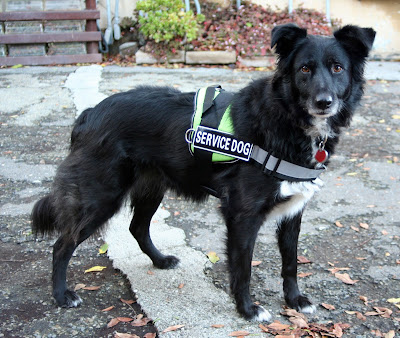Yes, Border Collies can be excellent therapy dogs. They are intelligent, energetic, and loyal, making them great companions for those in need of emotional support.
Border Collies are known for their keen intelligence and strong work ethic. These traits make them highly trainable and responsive to commands. Their energy and enthusiasm can bring joy and comfort to people in hospitals, nursing homes, or schools. With their gentle nature, they form deep bonds with those they assist.
This emotional connection can be healing. Border Collies can sense distress and offer comfort through their presence. Their playful spirit can lift moods and provide a sense of normalcy. For those looking for a loyal and engaging therapy dog, Border Collies are a fantastic option.
Introduction To Border Collies
Border Collies are known for their intelligence and agility. They excel in various tasks and are often seen in herding roles. But, can they be good therapy dogs? This blog post explores the characteristics and behavior of Border Collies to answer that question.
Breed Characteristics
Border Collies are medium-sized dogs. They weigh between 30 to 45 pounds. Their height ranges from 18 to 22 inches. They have a double coat that can be smooth or rough. Their coat colors vary. Common colors include black and white, red and white, and tricolor. They have a strong, muscular build. Their eyes are expressive, showing alertness and intelligence.
Temperament And Behavior
Border Collies are highly intelligent. They are quick learners and can understand many commands. Their energy levels are high. They need regular physical and mental stimulation. Without it, they can become bored and destructive.
They are also very loyal. They form strong bonds with their owners. They enjoy being around people and can be very affectionate. Their friendly nature makes them great companions.

Credit: www.certapet.com
Therapy Dog Qualities
Border Collies are known for their intelligence and agility. These traits make them excellent working dogs. But are they also good therapy dogs? Let’s explore the qualities that make a good therapy dog and see if Border Collies fit the bill.
Traits Of A Good Therapy Dog
Therapy dogs need a special set of traits. They must be calm and friendly. They should also be patient and well-behaved. Here are some key traits:
- Calm: Therapy dogs must stay calm in different situations.
- Friendly: They should enjoy being around people.
- Patient: They need to handle stress without showing aggression.
- Well-behaved: Basic obedience is a must.
Border Collies are often very active and energetic. This can be both an asset and a challenge. Their energy needs careful management. Proper training is essential.
Training Requirements
Training a therapy dog is not easy. It requires time and effort. Here are some key training areas:
- Basic Obedience: Sit, stay, come, and heel are essential commands.
- Socialization: They must get used to different people and environments.
- Specific Tasks: Therapy dogs often need to perform specific tasks.
- Behavior Testing: They must pass tests to ensure they are fit for therapy work.
Border Collies are quick learners. They excel in training programs. Yet, their high energy levels need consistent management. This ensures they remain calm during therapy sessions.
Training a Border Collie as a therapy dog can be rewarding. Their intelligence and loyalty can make them excellent companions for those in need.
Border Collies In Therapy Work
Border Collies are known for their intelligence and energy. These traits make them interesting candidates for therapy work. Their ability to learn quickly and their gentle nature can be a great asset in therapy roles.
Suitability For Therapy Roles
Border Collies excel in therapy roles due to their high intelligence and trainability. They are quick learners and can adapt to various environments. This is important for therapy work where they may encounter different situations and people.
These dogs are also known for their empathy and sensitivity. They can sense human emotions and often respond to them in a comforting manner. This makes them ideal for providing emotional support to those in need.
| Traits | Explanation |
|---|---|
| High Intelligence | Quick to learn and adapt. |
| Empathy | Can sense and respond to human emotions. |
| Trainability | Easy to train for specific tasks. |
There are many success stories involving Border Collies in therapy work. For instance, a Border Collie named Max helped a child with autism. Max provided comfort and helped the child feel safe during stressful situations.
Another story involves a Border Collie named Daisy. Daisy worked in a nursing home. She brought joy and companionship to the elderly residents. Her presence improved their emotional well-being.
- Max: Helped a child with autism.
- Daisy: Brought joy to nursing home residents.

Credit: boards.bordercollie.org
Benefits Of Border Collies As Therapy Dogs
Border Collies make excellent therapy dogs due to their intelligence and friendly nature. They offer comfort and companionship to people in need. Their ability to understand commands quickly enhances their effectiveness in therapeutic settings.
Border Collies are known for their intelligence and energy. These traits make them excellent therapy dogs. They provide both emotional and physical benefits to their handlers.Emotional Support
Border Collies are very affectionate. They form strong bonds with their handlers. Their loyal nature provides comfort and companionship. This is crucial for people dealing with loneliness or anxiety. Their playful behavior can lift spirits and reduce stress.Physical Benefits
These dogs are very active. They encourage their handlers to stay active too. Walking and playing with a Border Collie provides regular exercise. This helps improve physical health. Their energy also keeps people engaged and motivated. They help in maintaining a healthy lifestyle. “`Training Border Collies For Therapy
Training Border Collies for therapy work can be a rewarding journey. These intelligent dogs are eager to please, making them great candidates for therapy roles. Proper training is crucial for them to perform effectively. Let’s explore the steps involved in their training journey.
Basic Obedience Training
Start with basic commands like sit, stay, and come. Consistency is key. Use positive reinforcement techniques. Reward them with treats or praise when they follow commands. Basic obedience lays the foundation for advanced training.
Socialization is also important. Expose your Border Collie to various environments. This helps them become comfortable around different people and situations. A well-socialized dog is more adaptable and confident in therapy settings.
Advanced Therapy Training
Once basic obedience is mastered, move to advanced training. Focus on commands that are specific to therapy work. Train your dog to respond calmly to loud noises and sudden movements. This helps them remain composed in busy environments.
Teach them to approach people gently. In therapy settings, they need to be patient and calm. Practice these skills in diverse settings. This ensures they can handle any situation with ease.
Consider enrolling in a certified therapy dog training program. Professional trainers can provide valuable guidance. They ensure your dog meets all the necessary requirements for therapy work.
Training a Border Collie for therapy work requires time and effort. With patience and consistency, your dog can become a reliable and loving therapy companion.
Challenges And Considerations
Border Collies are known for their intelligence and agility. This makes them excellent working dogs. But being a therapy dog comes with its own challenges. Let’s explore some of these challenges and considerations.
High Energy Levels
Border Collies have high energy levels. They need constant physical and mental stimulation. This can be demanding for therapy dog handlers.
Consider the following points:
- Daily exercise is essential.
- They need tasks to keep their minds busy.
- Long walks or runs are necessary.
Without enough exercise, they can become restless. This can lead to unwanted behaviors.
Potential Behavioral Issues
Border Collies can develop behavioral issues. These issues stem from their high intelligence and energy.
| Behavior | Cause |
|---|---|
| Barking | Lack of stimulation |
| Chewing | Boredom |
| Nipping | Herding instinct |
Proper training can address these behaviors. Early socialization helps too. It’s important to understand their needs.
Success Stories
Border Collies are known for their intelligence and agility. Many wonder if they can be good therapy dogs. The answer is a resounding yes! They have helped many people. Their success stories are heartwarming and inspiring.
Case Studies
One case involves a Border Collie named Max. Max worked with children with autism. His calm and friendly nature helped children feel safe. He encouraged them to communicate and play. This improved their social skills and confidence.
Another example is Bella, a Border Collie who helped veterans. Bella assisted those with PTSD. She sensed anxiety and provided comfort. Many veterans reported feeling less anxious. Bella’s presence made a big difference in their lives.
Testimonials From Handlers
Handlers often share their experiences. One handler said, “My Border Collie, Lucy, transformed my life. Her intuition and empathy are remarkable. She knows when I am stressed and comforts me.”
Another handler stated, “Working with Duke has been amazing. He has a special bond with kids. He helps them open up and feel happy. Duke’s impact is incredible.”
These testimonials highlight the positive impact of Border Collies. Their natural abilities make them excellent therapy dogs.

Credit: www.servicedogcertifications.org
Frequently Asked Questions
Are Border Collies Good Therapy Dogs?
Yes, Border Collies can be excellent therapy dogs. They are intelligent, empathetic, and trainable. Their energy and attentiveness make them great companions for therapeutic purposes.
What Qualities Make Border Collies Good Therapy Dogs?
Border Collies are intelligent, attentive, and empathetic. They are easy to train and responsive to human emotions. Their energy and loyalty contribute to their effectiveness as therapy dogs.
Can Border Collies Be Trained As Therapy Dogs?
Yes, Border Collies can be trained as therapy dogs. Their intelligence and willingness to learn make them suitable for therapy training programs. Consistent training and socialization are key.
Are Border Collies Suitable For All Therapy Settings?
Border Collies are versatile but may not suit all therapy settings. They are best in active environments where their energy can be managed. Evaluate the specific needs of the therapy setting before deciding.
Conclusion
Border Collies can make excellent therapy dogs. Their intelligence helps them learn quickly. Their friendly nature comforts people. They thrive on human interaction. They love to stay active, keeping patients engaged. Their loyalty and dedication are unmatched. These traits make them reliable companions.
Training and socialization are key. With the right guidance, they excel. They bring joy and relief to many. So, consider a Border Collie for therapy work. Their presence can truly brighten lives.
